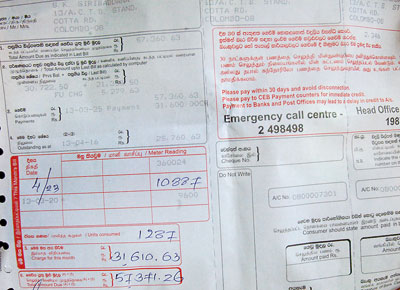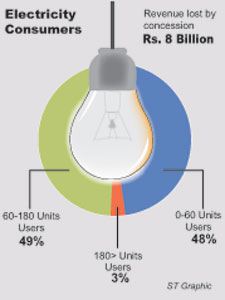News
Customers will have to take power costs on the chin, says business
View(s):Staff layoffs to offset bigger bills
By Mirudhula Thambiah
Businesses plan to pass on the electricity price increase to consumers, arguing they have few alternatives, and also warn they will be forced to lay off staff or freeze hiring. Hoteliers, industrialists and other non domestic business oriented sectors say they have no other option other than to pass on the cost to the consumers by increasing the price of goods.

The electricity bill of a business outlet in Colombo: More shocks to come
The hotel sector in particular is up in arms about the increase, complaining that it has been categorised separately from other industry in the new tariff proposal. Sri Lanka Hoteliers Association President Jayatissa Kehelpannala said hotels should be included in the industrial category, which has a lower tariff rate.
“We should be treated fairly,” he said. “The new tariff on hotels is high.” He said rate contracts had been already signed so that hotels could not increase their charges immediately to cope with the power prices. Hoteliers needed to change operating practices to bring down power costs.
Colombo City Tourist Hotels Association President N. Shanthikumar told the Sunday Times that the new electricity tariff was a disaster for the hotel industry. It would have the greatest price impact on the industry in recent years. “The increase in electricity tariffs will increase the cost of operation for all hotels and this will ultimately affect the tourist industry,” he said.
A hotelier from Negombo who has been in the industry for 30 years said demand for hotel rooms was already down as hotels in Sri Lanka were overpriced. The tariff increase would further reduce hotel profitability, with dangerous consequences for the tourist industry.
“There has been less (tourist) demand during April this year compared to last year. Income has decreased and costs have increased. The increase in electricity prices will affect our turnover even more and bring down our profit margin. We consume 40,000 units a month, which will cost around Rs. 750,000,” he said.
To cut costs the hotelier has decided to change all bulbs to LED. “This would be a big investment,” he emphasised. He has stopped recruiting more staff. Major factories and industries were also assessing the impact of the electricity charge increases and contemplating cutting down costs.
 Sanath Wanigasekera: No option but to increase his tailoring charges. Pix by Nilan Maligaspe |
 A.G.F. Wafaz: Increasing prices at his eatery and cutting down on staff |
 Salon owner M.I Kumar: Hopes to save by switching off unwanted lights |
Some were already restricting the use of air-conditioners and had issued strict instructions on switching off lights and fans.
Many say they would somehow have to pass the cost to customers in order to cope with the electricity bills. Sanath Wanigasekera, 52, a tailor-shop owner in Colombo 10, complained that the proposed electricity tariffs were very high for non-domestic consumers. “The increase in electricity tariffs will surely bring in reverses to my business,” he said. “There are no alternatives; we use large amounts of electricity for our business and we cannot avoid that,” he said.
He would definitely increase sewing charges. “There is no other way than passing the cost to the consumers,” he said. A salon owner in Maradana, M.I Kumar, 24, said he consumed around 340 units of electricity a month, which was a large cost which would increase after the electricity tariff revision.
He said sadly that he would not be enjoying a 25 per cent concession as his consumption exceeded 180 units. “I cannot increase the charges to customers – they will not spend that much – and my income will decrease,” he said. “My employees and I have decided to switch off unwanted lights. We used the air-conditioner for 10 hours a day until now but since last month we have been using it only for six hours in order to save power costs.”
He urged the government to bring in a concessionary rate for non-domestic users too. Pharmacy owner T. Navasekar, 26, said he usually paid around Rs.18,000 a month on electricity, exceed 180 units of consumption.
“We have to store medical items in the refrigerators and cannot switch them off to save power,” he said. “At the same time we cannot increase the prices of medicines, unlike other businesspeople.” He was anxious about having to absorb the 60 per cent electricity price increase.
One business owner who will pass the higher power prices on to his customers is Borella eatery owner A.G.F. Wafaz who said the prices of food items will be increased. He has also decided to reduce staff to save costs. “I pay Rs.40,000 for electricity a month. I have to find a mechanism to balance the cost so I decided to increase the prices of food items and reduce the number of staff,” he said.
P.T. Jeyakumar, 42, manager of Vani Vilas hotel in Armour Street, said electricity costs would not be passed to the customers as the prices of food items hade already been increased in the recent past due to price increases of other goods, and the 60 per cent new increase in electricity charges would have to be absorbed by the enterprise.
 |
 |
“We have to bear a large cost when the electricity tariffs are increased,as we already pay Rs.150,000 each month for consuming 6000 units. Since last month, employees have been advised to switch off the fans when there are few customers,” Mr Jeyakumar said.
Sampath Bandara, manager of a garment factory in Kohuwala, said garments industrialists could not increase prices of goods at will to cope with the new tariffs since there was a fixed price mechanism in the market.
“We use around 1000 units a month which will cost Rs. 50,000. This charge will increase after the new tariffs are implemented. We have experienced less business demand from the previous month and so it’s going to be difficult to cope with the new electricity costs,” he said.
Union alliance threatens all-out strike from May 21
The Trade Union Alliance has threatened a full-scale strike from May 21 if the Government did not reverse the proposed electricity tariff hikes by May 20.
Simply giving concessions would not fulfil union demands, said Wasanth Samaranayaka, one of the alliance convenors.
The Alliance, in a statement, said the price hike of 60 per cent was the highest recorded in any country and had caused great concern.
“The concessions that the working population of the country expected through the 2013 budget have yet to be delivered. Oil, bus tariff, gas, necessary goods, birth-marriage-death certificate taxes were increased,” the alliance statement says.
“Stamp charges for petitions were increased by Rs. 250, insurance contributions by Rs .50, while Rs. 750 which was given to public servants was robbed from us. Parents of schoolgoing children will now have to pay taxes. There is no medicine in Government hospitals.
“In this scenario it is by no means justified or fair to increase the electricity tariffs. “We, as the co-ordination committee for the Trade Union Alliance, asks for zero hike of the electricity bill as it has been opposed by 95 per cent of members. “It is the Government’s responsibility to reveal the corruption and misuse that leads to the uncontrolled increase in power consumption. Yet this is not been revealed to the public.
The 2012 Central Bank report shows that hydro-power production has gone down by nearly 50 per cent. Thermal energy has gone up by a significant amount,” the statement said.
It added that the 4.842 million of the 5 million consumers who account for 95 per cent of electricity consumers in the country used fewer than 200 units of electricity each. “This is why this deals a heavy blow to the common man. The industrial peace of the country is at stake. That is why we ask for a full reversal on the tariff hike,“ the alliance said.
Mahinda Jayasinghe, General Secretary Ceylon Teachers’ Services Union and one of the co-convenors of the alliance said the tariffs were unjust. “We urge the Government to abolish the proposed system and to bring in a new tariff system which is fair to all people from all sectors by discussion with organisations and trade unions” he said.
While K. Velayutham, General Secretary of the Lanka Jathika Estate Workers Union said it was unlikely that the middle class or people who earned small salaries could cope with the higher power prices. “We urge the Government to bring in a fresh tariff proposal,” he said.
Follow @timesonlinelk
comments powered by Disqus




















